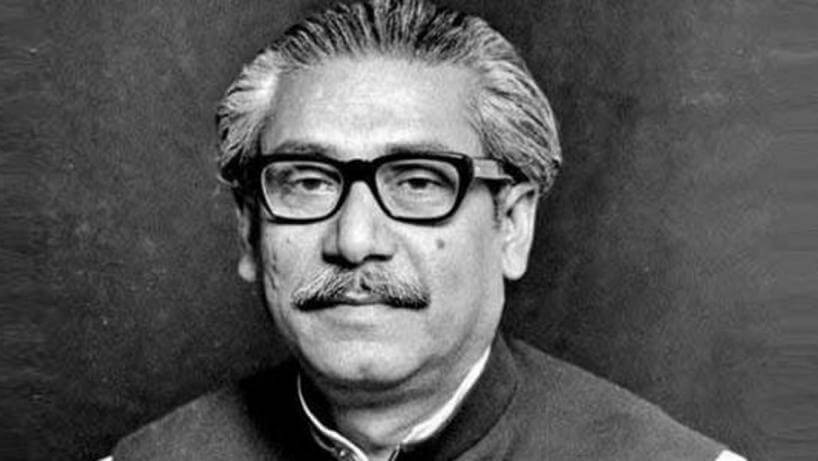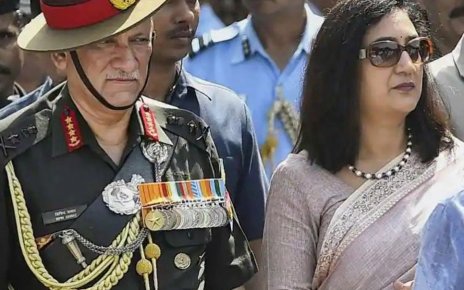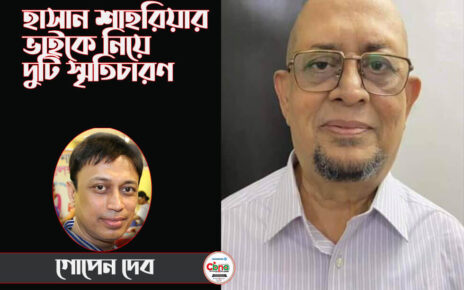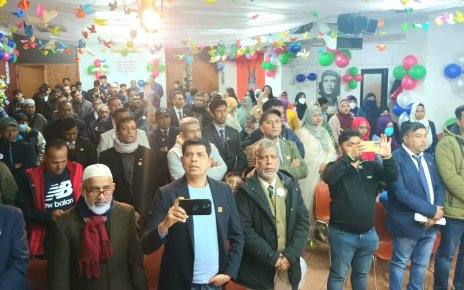Paying glowing tribute to Bangabandhu Sheikh Mujibur Rahman ||| Bidyot Bhowmik
The nation of Bangladesh is going to observe the National Mourning Day as well as 46th martyrdom anniversary of Father of the Nation of Bangladesh Bangabandhu Sheikh Mujibur Rahman on 15th August with due respect and utmost solemnity. The Father of the Nation Bangabandhu Sheikh Mujibur Rahman and most of his family members were brutally assassinated by some disgruntled and notorious army officers and men on the tragic night of August 15, 1975 and this inhuman carnage is touted as the most tragic chapter of the nation’s history.
The incumbent Prime Minister of Bangladesh, Sheikh Hasina, the eldest daughter of Bangabandhu, escaped that planned assassination with her sister Sheikh Rehana as they were staying out of Bangladesh at the time of that tragic event. The government has taken elaborate programmes to observe the 46th martyrdom anniversary of Father of the Nation Bangabandhu Sheikh Mujibur Rahman and National Mourning Day with due respect and solemnity by maintaining health guidelines. Wreaths will be placed at the portrait of Father of the Nation Bangabandhu Sheikh Mujibur Rahman in front of Bangabandhu Memorial Museum in the city. The President and the Prime Minister will pay homage to the chief architect of the independence of Bangladesh by placing wreaths at the portrait of Bangabandhu in front of Bangabandhu Memorial Museum at Dhanmondi Road No. 32 in the capital. Guard of honour will be presented by the Armed Forces and prayers will also be offered. Due to the outbreak of the Global Pandemic of Corona virus (COVID-19), mass public gatherings were postponed for the safety of the people in this regard for the time being.
Bangabandhu Sheikh Mujibur Rahman is called the chief architect and the father of the nation of Bangladesh. Bangabandhu Sheikh Mujibur Rahman was born on 17 March 1920 at Tungipara, a village in Gopalganj District in the province of Bengal in British India, to Sheikh Lutfur Rahman. He served as the first President of Bangladesh and later on as the Prime Minister of Bangladesh. He is considered to be the indomitable driving force behind the independence of Bangladesh in 1971. As a person, Bangabandhu Sheikh Mujibur Rahman stood out as a towering figure coupled with undaunted spirit who shouldered the hopes of the millions of people through difficult times. He is popularly dubbed with the title of “Bangabandhu” means “Friend of Bengal” by the people of Bangladesh because of his true love and sacrifice for Bangladesh and its people. He became a leading figure and eventually the leader of the Awami League, founded in 1949 as an East-Pakistan based political party in the then Pakistan. Sheikh Mujib is enormously credited as an important figure in efforts to gain political autonomy for East Pakistan and later on as the central figure and chief architect behind the Bangladesh Liberation Movement and the Bangladesh Liberation War in 1971. His daughter Sheikh Hasina is the current leader of the Awami League as well as he Prime Minister of Bangladesh.
The Awami League, under the dynamic leadership of Bangabandhu Sheikh Mujibur Rahman, swept to a landslide victory in Pakistan’s 1970 general election. However, the National Assembly failed to convene on Mar 3, 1971 to swear in the new Prime Minister (who was Bangabandhu Sheikh Mujibur Rahman), because the then dictator President of Pakistan, General Yahya Khan and rival party leader, Zulfiqar Ali Bhutto vehemently opposed a ruling party from East Pakistan as part of their conspiracy theory. Following political deadlock, President Yahya Khan delayed the convening of the assembly – a move seen by Bengalis as a notorious conspiracy to deny Mujib’s party named Awami League, which won majority of seats, from forming the Government. It was on 7 March 1971 that Bangabandhu called for the preparation of independence and courageously asked the people of Bangladesh to launch a major campaign of civil disobedience and organized armed resistance at a mass gathering of people held at the Race Course Maidan in Dhaka. His speech on Mar 7, 1971 in front of more than 1 million people in Dhaka has been touted as a pinnacle moment of the independence struggle of Bangladesh. It also took plenty of courage and determination to face unsurmountable odds, especially in a political environment where life was at the mercy of those who ruled Pakistan with iron hand without democratic rule of law. His landmark speech is considered the first indirect announcement of the country’s “liberation war”. On 7th March, 1971 Bangabandhu courageously said by defying Pakistani warning and provocation “Since we have given blood, we will give more blood. God-willing, the people of this country will be liberated … Turn every house into a fort. Face (the enemy) with whatever you have. The struggle now is the struggle for our emancipation; the struggle now is the struggle for our independence. Joy Bangla!.”
His unwavering courage spread through the ranks of the resistance groups in East Pakistan to fight against the crimes and genocides committed by the Pakistani army. The Bangladesh Liberation War had resulted in 3 million casualties and deaths and displaced more than 10 million Bengalis who fled to neighbouring India. The cost of the war was unsurmountable. Time Magazine reported in 1972: “In the aftermath of the Pakistani army’s rampage last March, a special team of inspectors from the World Bank observed that some cities looked ‘like the morning after a nuclear attack.’ Since then, the destruction has only been magnified. An estimated 6,000,000 homes have been destroyed, and nearly 1,400,000 farm families have been left without tools or animals to work their lands.”
Despite the overwhelming setbacks, Bangabandhu Sheikh Mujibur Rahman took it upon himself to steer Bangladesh out of its predicament after liberation of Bangladesh in 1972. His charismatic leadership and his true love for Bangladesh provided the much-needed confidence for its people to reconstruct the battered country after independence of Bangladesh. Bangabandhu Sheikh Mujib embarked on a Nationalization program to rehabilitate the estimated 10 million refugees and revitalised the nation’s economy through state investments into rural infrastructure, agriculture and cottage industries. Unfortunately, on August 15, 1975 some evil Bengalis as well as a fraction of the Pakistani minder army officers, assassinated him with almost all of his family members. We deeply mourn the death of Bangabandhu Sheikh Mujibur Rahman by paying glowing tribute to Him.
As a person, Bangabandhu Sheikh Mujibur Rahman stood out as an outstanding figure who shouldered the hopes of the millions through difficult times. Senior Awami League leader and former Commerce Minister Tofail Ahmed said, “The greatest achievement of Bangabandhu Sheikh Mujibur Rahman was that he congregated the people of Bangladesh and declared liberation.” Tofail Ahmed further said “His sole dream was to free Bangladesh from the misrule of Pakistan. He is a great leader who never compromised with oppression.” Syed Anwar Hussain, a historian at the University of Dhaka, told Anadolu Agency that Bangabandhu had a multidimensional personality. In a 2004 BBC Bengali opinion poll, Mujib was voted as the “Greatest Bengali of All Time”. Cuban leader Fidel Castro compared Mujib’s personality with the Himalayas during the Non-Aligned Summit in 1973. In 30 October 2017, UNESCO recognised Mujib’s 7th March Speech as part of the world’s documentary heritage. With love and respect, I pay my glowing tribute to this multidimensional personality and the father of the nation of Bangladesh, Bangabandhu Sheikh Mujibur Rahman on his 46th martyrdom anniversary.
Source: Wikipedia and translation
Paying glowing tribute to Bangabandhu Sheikh Mujibur Rahman ||| Bidyot Bhowmik , Former professor, writer and advisor to CBNA
14th August 2021
দেশ-বিদেশের টাটকা খবর আর অন্যান্য সংবাদপত্র পড়তে হলে CBNA24.com
সুন্দর সুন্দর ভিডিও দেখতে হলে প্লিজ আমাদের চ্যানেল সাবস্ক্রাইব করুন
আমাদের ফেসবুক পেজ https://www.facebook.com/deshdiganta.cbna24 লাইক দিন এবং অভিমত জানান

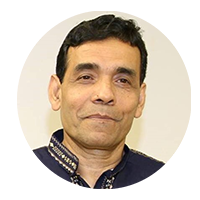 Bidyot Bhowmik
Bidyot Bhowmik
